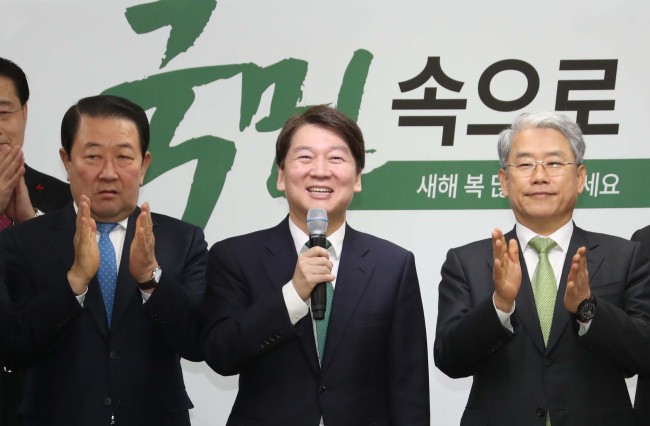South Korea’s two minor parties are speeding up their merger process, following the People‘s Party’s all-member vote that favored the proposed merger with Bareun Party.
In the four-day vote of confidence for Chairman Ahn Cheol-soo, who proposed the merger with the center-right Bareun Party, 74.6 percent voted for Ahn, while 25.6 percent opposed, the party’s election committee announced on Sunday.
Ahn vowed to take the lead in creating a new party that would bring changes to South Korean politics.
“We will become a reformative, young-spirited party that can bring together rational liberals and reform-minded conservatives,” he said.
Bareun Party Chairman Rep. Yoo Seong-min released a statement welcoming the result of the vote, and congratulated Ahn.
As they aim to complete the merger by February, the center-right party immediately proposed creating a bilateral consultative group to discuss the details of the merger, including the name and values of the new party, and on ways to elect its new leadership.
 |
People’s Party Chairman Ahn Cheol-soo delivers a New Year’s speech at the party’s headquarters in Yeouido, Seoul on Monday. (Yonhap) |
The two minor opposition parties have been struggling to gain a strong foothold at the parliament dominated by major liberal and conservative parties, and their leaders determined it crucial for the parties to unite to compete against the ruling party in the local election slated for June.
If their merger proceeds without hiccups, they will secure 50 parliamentary seats -- 11 lawmakers of Bareun Party and 39 lawmakers of People’s Party. The ruling Democratic Party of Korea holds 121 parliamentary seats and the main opposition Liberty Korea Party has 116.
The proposed new party appears to draw more support for the minor parties according to polls.
The People’s Party currently stands last in the approval rating of five political parties, recording around 4 to 5 percent approval rate in polls and the Bareun Party posts only a couple of percentage points higher.
According to Research and Research on Monday, the proposed new united party is supported by 14.2 percent of 1,005 respondents, ranking second in the list of four political parties, following the ruling Democratic Party’s 40.8 percent. The main opposition Liberty Korea Party came third, posting at 10.1 percent.
In another survey by Korea Research, the proposed new party appeared to garner a supporting rate of 19 percent from 1,017 respondents, placing the party second in the list, behind the ruling party which stood at 43.3 percent.
“In South Korea’s dichotomous political sphere, the emergence of the new party that poses as a centrist is very meaningful,” Yoon Pyung-joong, a political philosophy professor at Hanshin University, said.
But their proposed merger process would face many hurdles and it would take a long time to be stabilized as a third faction, he added.
The anti-merger faction of 18 lawmakers are calling for the ouster of Ahn and are hinting at a possible defection, arguing that Sunday’s turnout of 23 percent is insufficient to represent the whole party. Opposing voices from Bareun Party also appear to threaten a smooth merger.
While Shin said that it may not be easy for the new party to gain a fruitful result in the upcoming local election, he said it is crucial for them to gather support from the many undecided voters that are not reflected in the polls.
“Though the poll shows high support for the ruling Democratic Party, they only reflect the rate of approval among those who answered as undecided, and not those that refused to answer. In other words, there may be conservative and undecided voters that can vote to greatly change the outcome of elections,” he said.
A high turnout for the upcoming local election would determine the successful merger of the two parties.
“They need to target the 30 percent of undecided voters. And to bring their votes to the ballot, high turnout is crucial,” Shin said.
As for the possibility of lawmakers defecting to other parties, Shin said it is unlikely.
“Most of those in the People’s Party opposed to the merger would not be able to find a new party to settle in, because the big figures, such as Chun Jung-bae and Park Jie-won would not be accepted in the ruling Democratic Party,” he explained. “As for first and second term lawmakers, it is more beneficial for them to stay in the People’s Party as they would have to compete for their place if they were to defect to a new party.”
(
herim@heraldcorp.com)





![[KH Explains] For Korean automakers, Chinese EVs may loom larger than Trump’s tariffs](http://res.heraldm.com/phpwas/restmb_idxmake.php?idx=644&simg=/content/image/2024/11/14/20241114050537_0.jpg)
![[Graphic News] Tainan predicted top destination for South Koreans in 2025](http://res.heraldm.com/phpwas/restmb_idxmake.php?idx=644&simg=/content/image/2024/11/13/20241113050807_0.gif)

![[Herald Review] Cho Seung-woo takes 'Hamlet' crown](http://res.heraldm.com/phpwas/restmb_idxmake.php?idx=644&simg=/content/image/2024/11/14/20241114050593_0.jpg)